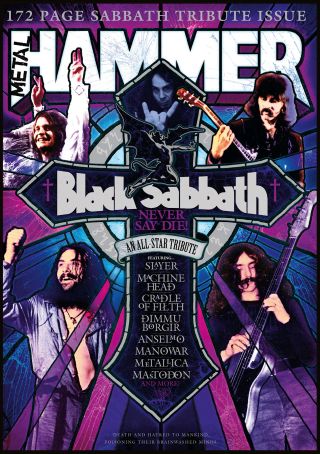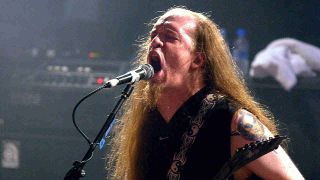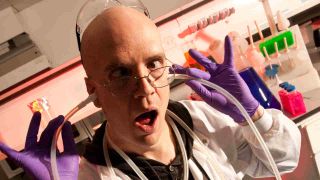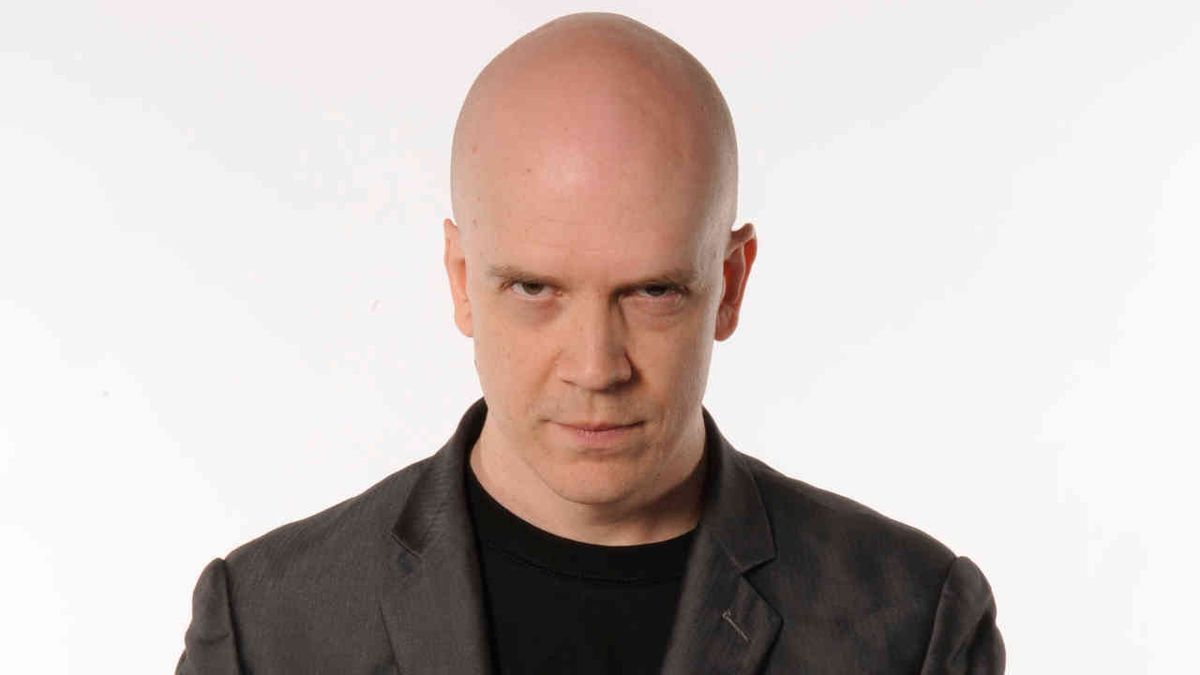Devin Townsend is a one-off, a genuine musical maverick who has blazed his own trail for more than 30 years. In 2012, the Canadian singer and multi-instrumentalist looked back over a career that has taken in incredible highs, tortuous lows and defecating in a guitar hero’s instrument case.
If they handed out an award for Hardest Working Man In Metal, then Devin Townsend would be a shoe-in. Since kicking off his career as vocalist on guitar god Steve Vai’s 1993 album Sex & Religion, the maverick Canadian has barely paused to draw breath.
His CV speaks for itself: as well as numerous albums released under his own name, there’s been Strapping Young Lad, Devin Townsend Project, The Devin Townsend Band, Ocean Machine, Zimmer’s Hole, IR8, a brief stint in The Wildhearts and guest appearances with everyone from Lamb Of God to GWAR. Oh and a glove puppet.
It’s a body of work unmatched in modern metal: sprawling, deranged, frequently brilliant and occasionally frustrating – just like the man who made it. From Strapping Young Lad’s extreme metal showboating to the kaleidoscopic beauty of his work as The Devin Townsend Band, the multiple facets of his music reflect a complex and often conflicted personality.
But sift through the chaos and themes emerge: the wall-of-sound approach that Devin deploys whether ramping up the volume or floating blissfully away; the sarcasm and self-laceration that make up his lyrics; the Canadian brand of ‘wacky’ humour that plunges a drawing pin into the proceedings when the grandiosity threatens to balloon out of control.
In the flesh, he looks less like a troubled metal iconoclast and more like a born again Christian about to thrust a pamphlet into your hand. The all-black ensembles have been replaced by a silver-grey suit; a pair of granny glasses perch on his nose; the ‘skullet’ hairstyle that gave him the air of a lunatic scientist has long gone, leaving a stubble-free dome. When he talks, it’s with the measured self-analysis of a man who’s spent years try to make sense of what goes on in his own head.
”It’s been a long road,” he says. “The irony is that I never wanted to be the centre of attention, I’ve always wanted to be invisible.”

Devin says he was four when he first picked up a guitar and five when he wrote his first song. Music was all around him – his half-English, half-Irish family loved traditional bluegrass and Celtic folk.
“Dad played 12 bar blues and he had an old acoustic guitar,” he says. “My aspiration was to be better than my dad. When I was eight, I was able to play the same things. I think it pissed him off. He never jammed with me again.”

In his mid-teens, Devin joined a proper band – punk-metal outfit Grey Skies. “The bassist was older and he came from a punk background, and it had an element of that,” he says. “I liked the ethos humour of punk but I played too much Dungeons & Dragons so I could never really hang with the punk guys.”
More important was his next band, Vancouver thrashers Caustic Thought. That’s where he first crossed paths with future Strapping Young Lad bandmates Jed Simon and Byron Stroud.
“They were the big band in town; everyone wanted to open up for them. When Jed quit they hired me… and fired me after two months. I was playing guitar with a dildo and being an idiot.”
It was the first glimmer of a willfully obnoxious streak that would come to define large parts of his career. After Caustic Thought, he began work on a thrash, industrial-tinged solo project called Noisescapes. In an attempt to get signed, he bombarded record labels with demo tapes in unconventional packaging.
“To get attention I wrapped them up in my underwear – piss stains, leftovers, everything,” he says. “I taped the demo to the crotch. Ha ha! It worked, though. Cliff Cultreri from Relativity called and said, ‘What are you doing tomorrow? We’d like to fly you to New York and sign you.’”
Relativity had an ulterior motive for offering the 19-year-old a deal. Steve Vai was looking for a vocalist for his new album, Sex & Religion, and Devin’s new paymasters asked if he wanted the gig. Against his better judgement, he agreed.
“When I was 15, Vai meant the world to me,” he says. “When I was 19, my connection to music was Jane’s Addiction, Godflesh, Napalm Death. I was like, ‘I’m angry all the time.’ I remember hearing the music and hearing the lyrics, and thinking, ‘Oh, this is not where I’m at.’’
A subsequent tour with Vai supporting Aerosmith found him lashing out like a surly teen. While his guitar playing was improving, he’d go onstage in a tutu and chicken slippers in an attempt to sabotage the shows and his relationship with Vai.
“I couldn’t articulate the anger to him at that time, so I took a shit in his guitar case and took photos of me with every one of his guitars with my balls on them. Like, ‘Fuck this – please let me go, I just wanna make my music.’”

The pair parted ways soon after (though Devin would guest on subsequent Vai albums and says that they’re good friends today). The next year found him guesting with The Wildhearts and Canadian industrial titans Frontline Assembly, and forming IR8, an ad hoc metal supergroup with Metallica bassist Jason Newsted.
“It was a reaction to the Vai period,” he says of his pinballing musical adventures. “I felt I had something to offer musically and I wanted to find avenues to make that known. I also got dropped by Relativity at the same time.”
The label’s reasoning was that the music he was making was too schizophrenic – some of it was heavy, some of it was mellow. Devin thought the two styles could exist side by side; Relativity disagreed. The label had the last word, though some of the songs he had written would later be recycled for both SYL and his less abrasive Ocean Machine project.
“Why didn’t just I separate them? I don’t think I was asked,” he says. “Well, to be honest, I probably was but I was too busy sulking about something inconsequential.”
If the loss of his record deal was a body blow, then it was at least one that Devin was going to absorb and use as fuel for his next musical project: Strapping Young Lad.
“I was nihilistic,” he says. “All the things that I thought were important about music had been treated with such ambivalence. So I said, forget about all the sensitive stuff – the stuff that’d become Ocean Machine – I’m just gonna make some noise at this point. Something that says ‘Fuck you’ in the most profound way.”
Taking his cues from Godflesh, Napalm Death and Fear Factory’s game-changing debut album, Soul Of A New Machine, he worked fast. Devin sang and played the majority of the instruments; the resulting record, Heavy As A Really Heavy Thing, was released in April 1995 via Century Media. While its energy, anger and humour were undeniable; it lacked the barmy ambition and finesse of subsequent albums.
“I kind of threw together Heavy As…,” he says. “In The Rainy Season was a really good song, as was S.Y.L. But really, that record was a bunch of mish-mashed demos. What defined that period was an authentic sense of self- destruction: ‘I don’t care about me any more.’”
If Heavy As A Really Heavy Thing was a barf of profanity and rage, the follow-up, City, was a different beast. With his old Caustic Thought mates Jed Simon and Byron Stroud onboard alongside man-mountain drummer Gene Hoglan, SYL were now a band rather than just a Devin solo project, though any notions that surrounding himself with other musicians would help ground him were way off base.
“For City, I tried to focus more,” he says. “I enjoyed the first Meshuggah record, and I was listening to [cult New York art-noise outfit] Cop Shoot Cop – they were dirty and junkie-sounding. Before City, I’d never done drugs, never experienced the true dark. Then I was like, ‘I’m gonna start doing drugs and drinking.’ Acid, hallucinogens, mushrooms, marijuana. That’s when things started to get serious and dark.”
City remains SYL’s highwater mark: brutal, epic, futuristic and funny. It was David Cronenberg’s Videodrone re-imagined by a crazed Canadian who fancied himself as metal’s Phil Spector.
For anyone who hadn’t been paying close attention to his career, Devin’s next move was surprising. Between Heavy As… and City, he’d released a zany punk-metal concept album under the moniker Punky Brüster, suggesting that his bow had more than one string. But 1997’s Biomech – credited at the time to Ocean Machine but later rebranded as a Devin album, titled Ocean Machine: Biomech – broadsided expectations laid by SYL. The serene comedown after SYL’s all-night party, its prog-tinged fluidity echoed Pink Floyd rather than Napalm Death. Some of the songs, including Funeral, The Death Of Music and Regulator, were songs that had sat on the shelf for two years.
“After City, I still had all this Ocean Machine stuff. The Vai record had gone gold in Japan, so [his Japanese label] Sony said, ‘Why don’t you start your own label and we’ll distribute the record.’ So I did. Without that, I would have given up on the fact that it had any validity.”
Artistic triumph aside, Ocean Machine also laid out an alternative path for Devin – one that led away from the confines of extreme metal. But the punishing workload, drugs and general mental disposition pushed Devin to a break- down. He was diagnosed as bi-polar, though that didn’t stop him mixing his prescription medication with acid.

“If you have a genetic predisposition for mental illness, which my family has, and it’s undiagnosed, any sort of stimulant you consume can exacerbate those symptoms to the point where you have an episode,” he explains. “I was angry over some things, depressed over others, and at other times I was full of energy. I had delusional senses of self-importance. I’d ended up having these delusions about God and my role in the universe. I thought I was the centre of the universe. I became fascinated in the infinite. That’s when I ended up writing [the grandstanding alt-metal opus] Infinity.”
Even by Devin’s standards, it was an indulgent affair. Flashes of over-reaching genius were kneecapped by smart-arse zaniness. It was a glorious – and sometimes inglorious – mess with a troubled soul at its centre.
“It was confusing but artistically validating, because it was so complicated,” he says. “The sense of self-importance that I attached to that record ended up being the point of it.”
In ’98, Devin checked into a mental hospital, although dealing with his problems wasn’t the main reason. “The image of being a crazy artist was romantic, so when the option came to being in an institution, I leapt at it. I saw people who had schizophrenia and bi-polar people who were not on drugs, who hadn’t exacerbated it the way that I had. It was incredibly humbling.”
Devin entered the new millennium as confused as he’d exited the last one. His first album of the 00s, the forgettable solo effort Physicist, sounded like a drab, watered-down SYL (it featured both Jed Simon and Gene Hoglan). “It’s a really grey, apologetic, poorly produced album,” he admits.
By contrast, 2001’s towering Terria was the sound of a man who had found his way again: great sweeping washes of guitar and keyboards daubed epic colours all across it.
His next move was a surprise: reuniting SYL. He’d parked the band five years earlier, after City, disillusioned that “this thing that started as an ironic ‘fuck everything’ ended up becoming this legitimate, angry entity.” Reuniting the old lineup in 2003, he assumed it would be easy to reconnect with what made the band work first time around. Easier said than done, and the resultant album, Strapping Young Lad, wasn’t as well received as City.
“It didn’t sound as good. I didn’t have my mind on what I was doing. The fact that it came out at the same time as Accelerated Evolution (his first album released as The Devin Townsend Band) didn’t help.”

After a brief deviation into ambient noise territory with 2004’s Devlab, Devin reconvened SYL for their fourth album, Alien. There was one simple driving factor for the frontman: “If you want crazy, I’ll show you fucking crazy.”
“At the time of Alien, I was on psychiatric meds and I stopped taking them,” he says. “It would have been fine if I hadn’t compounded that by smoking tons of weed and drinking every night, trying to reach artistic depths. That was among the stupidest things I’ve done.”
As twisted and extreme as he got, Alien sounded like the work of a man who was too far down the rabbit hole. His unhinged mental state manifested itself in the way he looked and his self-destructive behaviour. “The hair and the mad scientist thing…” he says. “And doing tons of interviews high on mushrooms.”
Devin admits to being “toxic” around at the time of Alien. But he stands by the album. “Alien is awesome,” he says. “It makes me cry sometimes, I like it so much.”
But doubts were creeping in. “With Alien, I was reaching into the depths of my psyche, and it drew schizophrenics towards me who were saying, ‘I understand.’ I was thinking, ‘Jesus, that’s not what I wanted… I was just trying to be honest about it’. I started to doubt whether my artistic sentiment was toxic by nature. And then I figured what I needed to do was finish SYL, because I couldn’t leave it open-ended.”
That final SYL record would be The New Black, written before the band were due play on the 2006 Ozzfest tour (though not before yet another solo album, Synchestra, which found Devin coming back to Earth after the excesses of Alien). In typically perverse style, Devin saw The New Black as an opportunity to reclaim SYL back from the fans,
“I thought, ‘I’m gonna write a pop record that essentially summarises that whole thing in a po-faced, ‘We suck, so do you’ way. That was the only way I could stick to what the real meaning of SYL was for me. ’Cos that way it could still be SYL saying, ‘This is bullshit.’”
The band played their last show on August 13, 2006, in West Palm Beach, Florida, as part of the Ozzfest. A month later, it was announced that they were going on “extended hiatus.” It had been a tough decision to make:
“It was horrible. SYL meant so much to me. I’ve never played with a drummer that I’ve been closer to than Gene. I’d played with Jed and Byron since Caustic Thought. We were doing all this good shit, and I pulled the rug out from under it. My buddies were like, ‘What the fuck?!’”
“After I quit SYL, I quit drink, I quit drugs, I had a baby, four people in my family died, my sister had two kids, I cut my hair off, I moved, I ran out of money, I opened three studios, I produced a bunch of good bands and a bunch of shitty bands. That was more change in one period than I’d had in my whole adult life.”
Over the next few years, his work rate slowed to what was a snail’s pace by his standards: a second ambient solo album, The Hummer, in 2006 was followed by love-it-or-hate-it cartoon rock opera Ziltoid The Omniscient, about an alien puppet who threatens to destroy Earth unless he can find the perfect cup of coffee, followed in 2007. And then he decided to take two years off – or at least that was the plan.
“I picked up a guitar and the first thing that came out was this riff for Gato. I was, like, ‘I guess that’s the direction we’re going in!’”
Gato would appear on the brooding Ki, the first of four interlinked albums released by The Devin Townsend Project between May 2009 and June 2011. The other three – the eclectically heavy Addicted, the chaotic and darkly funny Deconstruction and the starkly beautiful Ghost – show off every side of his personality in a way that he’s been striving for his whole career.
“My fear manifested itself as an innate destructive tendency,” he says. “The Devin Townsend Project is an exercise in me confronting that fear and recognising that not only am I in full control of it now, but that that self-destructive tendency was a result of my chemistry not working with drugs and alcohol.”
Today, Devin finally seems to be at ease with himself. His look might have radically changed since the 1990s, but the imperative to make music and salve the sounds in his head hasn’t gone away.
“I’m so far away from the skinny kid shitting in Vai’s guitar case,” he says. “You’ve got to deal with the repercussions of the music and the financial elements of it and that people are angry at you. I had to learn that accountability was on my shoulders for everything I did.”
Originally published in Metal Hammer issue 232, May 2012


